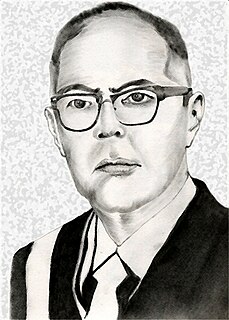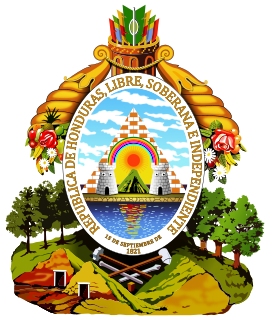A legislative election was held in Honduras on 7 October 1956. The people elected 58 deputies to the Constituent Assembly.

Honduras, officially the Republic of Honduras, is a country in Central America. In the past, it was sometimes referred to as "Spanish Honduras" to differentiate it from British Honduras, which later became modern-day Belize. The republic of Honduras is bordered to the west by Guatemala, to the southwest by El Salvador, to the southeast by Nicaragua, to the south by the Pacific Ocean at the Gulf of Fonseca, and to the north by the Gulf of Honduras, a large inlet of the Caribbean Sea.
Contents
The President Julio Lozano Díaz decided to hold rigged elections for a new legislature in October 1956. With the Liberals exiled and the Carías faction of the Nationals boycotting them, the elections were an easy victory for Julio Lozano Díaz Lozano. Nonetheless, blood ran in the streets when a group of protesting Liberals were fired on by police in Tegucigalpa. [1]

Julio Lozano Díaz, was first Vice President of Honduras (1949–1954) and then President of Honduras, from 5 December 1954 until 21 October 1956.

The Liberal Party of Honduras is a centre-right liberal political party in Honduras that was founded in 1891. The party is a member of the Liberal International. The PLH is identified with the color red and white, as the flag Francisco Morazan used in most of his military campaigns during time of the Central American Federal Republic.

Tiburcio Carías Andino was a Honduran military man with a reputation as a strongman. He founded the National Party of Honduras in 1918, and was President of Honduras twice; briefly in 1924 and from 1933 to 1949.
The fraud was transparent. With both traditional parties denouncing Julio Lozano Díaz Lozano’s already illegal and increasingly unpopular regime and the prospect of further violence quite manifest, the army was obliged to intervene. [2]
“On 21 October a military coup led by the younger officers unseated the seventy-one-year-old dictator, who was hustled into exile without bloodshed and without ceremony. Having won power…they began to set in motion the machinery for truly free elections to give the country a constituent assembly which in turn would choose a new president”. [3]
The top conspirators included Colonel Héctor Caraccioli, head of the air force; Major Roberto Gálvez Barnes, minister of development; and General Roque J. Rodríguez, director of the military academy in Tegucigalpa. These officers then organized a military government with General Rodríguez as its apparent leader, primarily because of his seniority. [4]

Tegucigalpa, colloquially referred to as Téguz, is the capital and largest city of Honduras along with its twin sister, Comayagüela.





